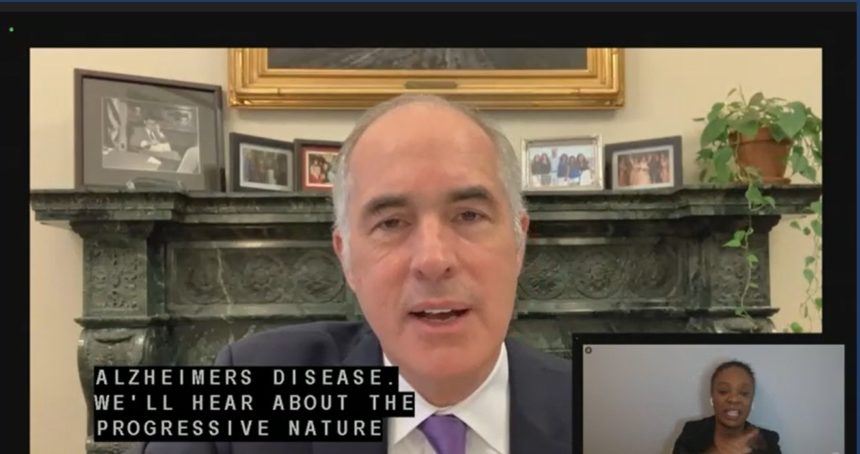
Developing a dementia-competent workforce and providing career advancement opportunities will help strengthen direct care workforce recruitment and retention, leading to a better quality of life for people living with dementia and their families.
That’s according to Alzheimer’s disease experts and caregivers testifying Thursday before the Senate Special Committee on Aging. They discussed elevating the value of the direct care workforce to be consistent with its essential role in caring for older adults with Alzheimer’s disease and related dementias.
Mark Supiano, M.D., chief of the Division of Geriatrics at the University of Utah School of Medicine and executive director of the University of Utah Center on Aging, cited statistics from the Alzheimer’s Association that there are now six million Americans living with the disease. The estimated costs of long-term care and other healthcare as well as hospice for Alzheimer’s disease and related dementias in the United States is expected to grow to $1.1 trillion by 2050, from $355 billion today, according to the association.
To address these staggering statistics, among Supiano’s recommendations is developing a dementia-competent workforce. That means educating and training the entire healthcare team, he said.
“There is a special need to support hands-on caregivers and the direct care worker — in the home and in long-term care settings — to equip them to care for persons with dementia,” Supiano said. “This support should include ensuring living wages, benefits and paid family leave.”
Supiano said he also supports efforts to expand home- and community-based services, which he said will help decrease excess healthcare system utilization and avoid premature move-ins to skilled nursing facilities.
Committee Chairman Sen. Bob Casey (D-PA), pointed out that the American Jobs Plan proposes new funding for HCBS. And a recent announcement from the federal government about the release of $1.4 billion in funding from the American Rescue Plan for programs affecting older adults for the first time in information about the plan acknowledged assisted living as an HCBS provider. In addition, the proposed Direct Creation, Advancement, and Retention of Employment (CARE) Opportunity Act would invest more than $1 billion over five years in training and opportunities for the direct care workforce.
“Home- and community-based services provide a lifeline for millions of American families. As we lift the shroud of this pandemic, think about how to bolster support for those afflicted with Alzheimer’s disease,” Casey said. “We can’t leave them behind as we head toward recovery. The American Rescue Plan has made great strides to ensure people with disabilities and older adults have access to services to help them live full and meaningful lives.”
According to the Agency for Healthcare Research and Quality, 2.2 million elderly or disabled Americans are enrolled in HCBS. The Kaiser Family Foundation estimates that almost 820,000 people are on HCBS waiver waiting lists, with an average wait time of 39 months. Assisted living providers in many states provide HCBS to Medicaid beneficiaries through waivers such as section 1915(c) waivers.
Jennifer Manly, Ph.D., from the Gertrude H. Sergievsky Center and the Taub Institute for Research in Aging and Alzheimer’s Disease at Columbia University, said that direct care jobs often are viewed as “dead-end jobs” because they are perceived to offer little career advancement. But workers who are offered opportunities for advancement can mentor, support and supervise other workers entering the field, which would increase the retention of direct care workers overall, she added.
“It is time to elevate the value of the direct care workforce to be consistent with the essential role that these careers play in the wellbeing of our society,” Manly said. “Facilitating career advancement opportunities within direct care will help strengthen recruitment and retention, and this stability and training produces better quality of life among people with dementia and their families.”
Manly said she supports taking an equity-focused approach to restore access and allocate resources to communities underserved by most dementia care services. Targeted recruitment and training of community members interested in healthcare careers, and increased reimbursement for skills such as bilingualism, she said, can help narrow gaps in access to high-quality culturally and linguistically appropriate services.
Hearing witness Katelyn Montanez, a family caregiver from Ephrata, PA, said that being an aide is hard work with little pay.
“Aides should be paid more for the work they do and have better access to dementia education and training for their workers,” Montanez said. “If aides received proper training to work with individuals living with Alzheimer’s and dementia, they would have the tools they need to redirect, would understand common behavioral issues, and it could lead to more successful interactions.”




